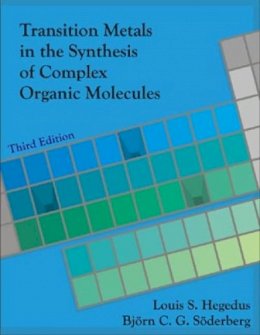
Stock image for illustration purposes only - book cover, edition or condition may vary.
Transition Metals in the Synthesis of Complex Organic Molecules, 3rd edition
Louis S. Hegedus
€ 102.44
FREE Delivery in Ireland
Description for Transition Metals in the Synthesis of Complex Organic Molecules, 3rd edition
Hardback. This texts offers a clear and systematic approach to the formation, manipulation, and reactivity of organometallic complexes. It presents the organic chemistry of transition metals by class of metal complex, with many examples of applications in the synthesis of complex natural products and pharmaceuticals. Num Pages: 420 pages, Illustrations. BIC Classification: PNND. Category: (U) Tertiary Education (US: College). Dimension: 221 x 286 x 30. Weight in Grams: 1328.
This texts offers a clear and systematic approach to the formation, manipulation, and reactivity of organometallic complexes. It presents the organic chemistry of transition metals by class of metal complex, with many examples of applications in the synthesis of complex natural products and pharmaceuticals.
This texts offers a clear and systematic approach to the formation, manipulation, and reactivity of organometallic complexes. It presents the organic chemistry of transition metals by class of metal complex, with many examples of applications in the synthesis of complex natural products and pharmaceuticals.
Product Details
Publisher
University Science Books,U.S.
Number of pages
420
Format
Hardback
Publication date
2009
Condition
New
Number of Pages
420
Place of Publication
Sausalito, United States
ISBN
9781891389597
SKU
V9781891389597
Shipping Time
Usually ships in 4 to 8 working days
Ref
99-1
About Louis S. Hegedus
LOUIS S. HEGEDUS is John K. Stille Emeritus Professor of Chemistry at Colorado State University, USA. He took his B.S. degree at Penn State University, USA where he carried out research in inorganic chemistry with Prof. Albert Haim, and received his Ph.D. from Harvard University, USA under the direction of Professor E.J. Corey, studying the use of organonickel chemistry in organic synthesis. He spent a post doctoral year at Stanford University, USA with Professor J.P. Collman, studying polymer supported catalysis. After a short period as visiting scholar at The Royal Institute of Technology in Stockholm, Sweden, with Professor Bjorn Akermark, he began his academic career at Colorado State University, USA, spending his career developing organometallic chemistry for use in organic synthesis. In collaboration with Professor Collman, he coauthored one of the first textbooks in the field of organometallic chemistry in 1980, Principles and Applications of Organotransition Metal Chemistry. In 1994 he wrote the first edition of this text, Transition Metals in the Synthesis of Complex Organic Molecules. BJORN C. G. SODERBERG is Professor of Chemistry at the West Virginia University, USA. Professor Söderberg received his M.S. and Ph.D. degrees from the Royal Institute of Technology, Stockholm, Sweden. He was a Postdoctoral Fellow at Colorado State University, USA working with Professor Louis S. Hegedus. He started his academic career at University of South Alabama, USA in 1990, and joined the West Virginia University, USA chemistry faculty in 1994. Professor Söderberg's research focuses on the discovery of new organic reactions catalyzed or mediated by organometallic complexes. He was one of the main contributors to the development of palladium-catalyzed cyclization reactions of nitroaromatic compound leading to nitrogen-containing heterocycles. Professor Söderberg has also contributed to the discovery of new reactions of Fischer carbene complexes.
Reviews for Transition Metals in the Synthesis of Complex Organic Molecules, 3rd edition
'This is a well written book that encapsulates much of what has been published recently, so it is a great update to the older editions. The key concepts come across very clearly.' - Nicholas E. Leadbeater, University of Connecticut, USA 'I enjoyed reading this book. There is a ton of information in it and I believe it will be very useful.' - Patrick J. Walsh, University of Pennsylvania, USA
